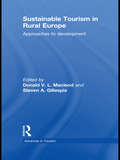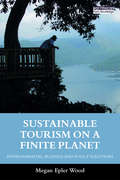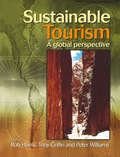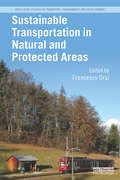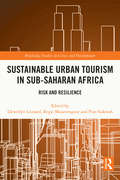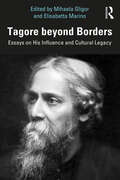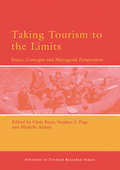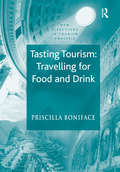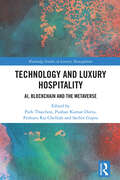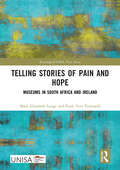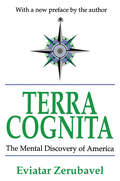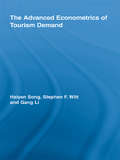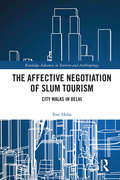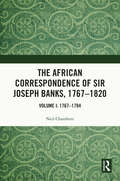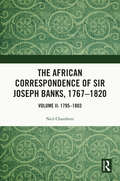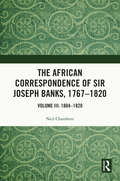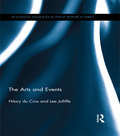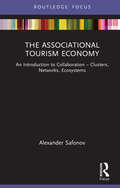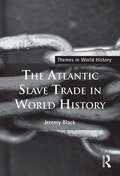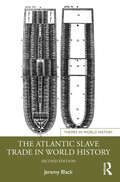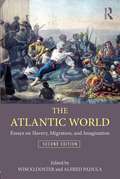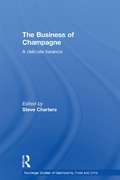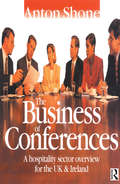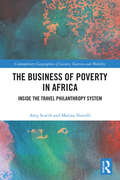- Table View
- List View
Sustainable Tourism in Rural Europe: Approaches to Development (Advances in Tourism)
by Donald V. L. MacleodRural Europe is a highly developed tourism region, representing advanced tourism experience and supposed modern approaches to this industry. That said, it remains highly sensitive and fragile in terms of environmental, social, economic and cultural impacts. This volume focuses on rural Europe as a fascinating example of how tourism development impacts on the communities and the environment of rural regions and offers insights into how long term sustainability could be achieved in this specific region and correspondingly in other rural parts of the world. Sustainable Tourism in Rural Europe contains contributions from leading international scholars that review and analyse the concept and practice of sustainable tourism in this region through a multidisciplinary approach that embodies the view that sustainable tourism warrants a holistic approach in terms of its impacts and development potential. Divided into three sections: Key Themes and Issues; The State and Development; The Local Community and Development, this book addresses contentious and vital issues through theory, detailed research and case studies, offering real world approaches to sustainable development, showing problems including local politics which challenge abstract models. It introduces cutting edge research dealing with contemporary developments throughout Europe and consequential lessons/implications for other rural parts of the world. This volume will be of interest to students, researchers and academics in the areas of Tourism, Geography and Environmental Studies.
Sustainable Tourism on a Finite Planet: Environmental, Business and Policy Solutions
by Megan Epler WoodThis book helps all those involved in international tourism develop the new skills, tools and investments required to protect irreplaceable global resources from the impacts of escalating tourism demand over the next 50 years. It documents how technology and the growing global middle class are driving a travel revolution which requires a new paradigm in managing tourism destinations. Travel and tourism supply chains and business models for hotels, tour operators, cruise lines, airlines and airports are analysed and environmental management techniques are proposed for each sector. A pragmatic set of solutions are offered to support the transition to lower impact tourism development worldwide. It recommends that decision makers assess the current and future value of natural, social, and cultural capital to guide investment in destinations and protect vital resources. Case studies illustrate why budgets to protect local destinations are consistently underestimated and offer guidance on new metrics. Innovative approaches are proposed to support the transition to green infrastructure, protect incomparable landscapes, and engage local people in the monitoring of vital indicators to protect local resources. It provides students, professionals, and policy makers with far-reaching recommendations for new educational programs, professional expertise, financing, and legal frameworks to lower tourism’s rapidly escalating carbon impacts and protect the health and well-being of local populations, ecosystems, cultures, and monuments worldwide.
Sustainable Tourism: A Global Perspective
by Peter Williams Rob Harris Tony GriffinSustainable Tourism is vital reading for anyone seeking to understand the complexities associated with sustainable tourism development, and how government and industry have responded to the challenges the concept poses.The major areas addressed in this edited volume are:* perspectives and issues associated with the concept of sustainable tourism development* accreditation, education and interpretation, including specific examples such as Green Globe 21, the European Blue Flag Campaign and the WWF's PAN Parks Programme* sustainable tourism case studies of tourist destination regions, natural areas and tourism enterprises drawn from Africa, Australia, the South Pacific, North America, South-east Asia and the CaribbeanAn impressive international editorial team has combined to present in this text not only a variety of perspectives on sustainable tourism development, but also significant insights into barriers, challenges and current industry and government responses to it in various parts of the globe. 'Sustainable Tourism' will be a welcome addition to the libraries of tourism industry professionals, individuals involved in the management of natural areas; tourism policy makers; tourism academics; and students with an interest in the future sustainability of tourism and the industry that supports it.
Sustainable Transportation in Natural and Protected Areas (Routledge Studies in Transport, Environment and Development)
by Francesco OrsiProtected areas are at the centre of nature-based tourism, which is increasingly popular across the world. As visitor numbers increase, so does awareness of the harmful effects that large crowds may have on both natural resources and individuals’ recreational experience. This volume considers the challenge of transportation to and within natural and protected areas, the improvement of which has already been recognised as having great potential for mitigating the environmental impacts of ecotourism. While several books have focused considerable attention to the management of protected areas in general, little has been said about the specific issue of sustainable transport, an emerging trend that is already reshaping visitation patterns in natural settings. This book provides current knowledge on issues associated with the transportation of visitors in natural and protected areas, and a comprehensive overview of the technical and strategic options available to tackle these issues. It approaches the subject via three main topics: preferences, or the visitors' attitudes towards transportation; practices, where current approaches are assessed through examples and case-studies of successful experiences and methodologies from around the world; and policies, where suggestions and recommendations are put forward for both local scale strategies and broad-scale regulatory action with global relevance. Contributors include academics in the field of natural resource management and tourism, with extensive experience in protected area management and active partnerships with natural park administrations.
Sustainable Urban Tourism in Sub-Saharan Africa: Risk and Resilience (Routledge Studies in Cities and Development)
by Pius Siakwah Llewellyn Leonard Regis MusavenganeThis book investigates urban tourism development in Sub-Saharan Africa, highlighting the challenges and risks involved, but also showcasing the potential benefits. Whilst much is written on Africa’s rural environments, little has been written about the tourism potential of the vast natural, cultural and historical resources in the continent’s urban areas. Yet these opportunities also come with considerable environmental, social and political challenges. This book interrogates the interactions between urban risks, tourism and sustainable development in Sub-Saharan African urban spaces. It addresses the underlying issues of governance, power, ownership, collaboration, justice, community empowerment and policies that influence tourism decision-making at local, national and regional levels. Interrogating the intricate relationships between tourism stakeholders, this book ultimately reflects on how urban risk can be mitigated, and how sustainable urban tourism can be harnessed for development. The important insights in this book will be of interest to researchers and practitioners across Tourism, Geography, Urban Development, and African Studies.
Tagore beyond Borders: Essays on His Influence and Cultural Legacy
by Mihaela Gligor Elisabetta MarinoThis book looks at Rabindranath Tagore’s creative art, social commitment, literary and artistic representation and his unique legacy in the cultural history of modern India – as a blend of the quintessentially Indian and the liberal universalist. Tagore’s genius, which he expressed through his poetry, songs, paintings, drama and philosophy, is celebrated across the globe. In 1913, he was awarded the Nobel Prize for Literature for his volume of poetry, Gitanjali (Song Offerings), making him the first Nobel laureate from Asia. This volume of essays celebrates his intellectual engagements and his incredible legacy by discussing the diverse ways in which his works have been reinterpreted, adapted and translated over the years. It analyses his perspectives on modernity, nationalism, liberation, education, post-colonialism and translatability and their relevance today. The leitmotif is a Tagore who, while imaginable as made possible only within the Indian tradition, eludes attempts aimed at identification with a national culture and remains a "cosmopolitan" in the best sense of the term.This volume will be of interest to readers and researchers in the fields of literature, philosophy, political science, cultural studies, Asian studies, South Asian studies and Tagore studies. Fans of Tagore will also find this an interesting read as it presents many little knows aspects of the poet’s work.
Taking Tourism to the Limits
by Chris Ryan Stephen J. Page Michelle AickenThe concept of margins and limits is often referred to within the tourism academic literature and includes subjects as diverse as carrying capacities, peripheral economies, technological advancement, adventure tourism, dark tourism and socially marginalized communities. After identifying a number of ways in which ‘limits’ might be defined Taking Tourism to the Limits explores concepts and challenges facing contemporary tourism in five main sections, namely in tourism planning and management, nature based tourism, dark tourism, adventure and sport tourism and the accommodation industry.Drawing upon case studies, current research and conceptualizations these different facets of the ‘limits’ are each introduced by the editors with commentaries that seek to identify themes and current practice and thinking in the respective domains. The picture that emerges is of an industry that reinvents itself in response to changing market parameters even while core issues of stakeholder equities and political processes remain problematic.International in scale, the book links with its companion piece Indigenous Tourism – the commodification and management of culture (also published by Elsevier) as an outcome of the very highly successful conference, Taking Tourism to the Limits hosted by the University of Waikato’ Department of Tourism Management in 2003.
Tasting Tourism: Travelling for Food and Drink (New Directions in Tourism Analysis)
by Priscilla BonifaceAlong with basic practical reasons, our practices concerning food and drink are driven by context and environment, belief and convention, aspiration and desire to display - in short, by culture. Similarly, culture guides how tourism is used and operates. This book examines food and drink tourism, as it is now and is likely to develop, through a cultural 'lens'. It asks: what is food and drink tourism, and why have food and drink provisions and information points become tourist destinations in their own right, rather than remaining among a number of tourism features and components? While it offers a range of international examples, the main focus is on food and drink tourism in the UK. What with the current diversification of tourism in rural areas, the increased popularity of this type of tourism in the UK, the series of BSE, vCJD and foot and mouth crises in British food production, and the cultural and ethnic fusion in British towns and cities, it makes a particularly rich place in which to explore this subject. The author concludes that the future of food and drink tourism lies in diversity and distinctiveness. In an era of globalisation, there is a particular desire to enjoy varied, rather than mono-cultural ambiance and experience. She also notes that there is an immediacy of gratification in food and drink consumption which has become a general requirement of contemporary society.
Technology and Luxury Hospitality: AI, Blockchain and the Metaverse (Routledge Studies in Luxury Management)
by Pethuru Raj Chelliah Park Thaichon Sachin Gupta Pushan Kumar DuttaThe integration of pioneering information and communication technologies has transformed the hospitality sector. This groundbreaking book delves into the transformative power of cutting-edge technologies in the world of high-end travel and accommodation. As the digital revolution continues to reshape our lives, this book offers an exclusive look at how the hospitality industry is adapting and evolving to cater to the sophisticated tastes of the modern, tech-savvy traveller.In this eye-opening exploration, readers will be taken on a journey through the latest innovations in artificial intelligence, blockchain, and the metaverse as they intersect with the world of luxury hospitality. From AI-driven concierge services and smart hotel rooms that cater to guests' every whim to the democratization of luxury experiences through blockchain-based loyalty programmes and the rise of virtual reality travel, this book reveals the extraordinary possibilities that lie ahead for the discerning traveller.With insights from international experts, this edited collection provides a comprehensive and engaging overview of the current and future trends shaping the industry and will be valuable to scholars and postgraduate researchers across the hospitality sector, innovation, and luxury management.
Telling Stories of Pain and Hope: Museums in South Africa and Ireland (ISSN)
by Ruth Teer-Tomaselli Mary Elizabeth LangeThe histories of South Africa and Ireland have been tumultuous and traumatic. Both countries have experienced political repression, sectarian violence and oppression that still impact the spiritual well-being of people today. Their parallel histories are of colonialism, displacement and division, and a fight for land and sovereignty. Both countries have embarked on a process of healing and reconciliation, yet there is an ongoing struggle for reparation and/or reversal of previous injustices.Recognising that museums of the 21st century have the potential to contribute to catharsis and mutual understanding, this book reflects on selected museums in South Africa and Ireland that commemorate the pain of the past and the hope for the future. The primary focus of the book is the way in which museum guides, curators and managers share their stories and the stories of their ancestors, and the stories of other people’s ancestors who were caught up in the conflict while interweaving the stories of the authors as well.Print edition not for sale in Sub Saharan Africa.
Terra Cognita: The Mental Discovery of America
by Eviatar ZerubavelMost of us are fascinated by the conventional storybook account of Christopher Columbus' heroic discovery of America in 1492. Yet, should the credit for discovering America go to a man who insisted it was but a few islands off the shores of China?In Terra Cognita, Eviatar Zerubavel argues that physical encounters are only one part of the complex, multifaceted process of discovery. Such encounters must be complemented by an understanding of the true identity of what is being discovered. The small group of islands claimed by Columbus to have been discovered off the shores of Asia was a far cry from what we now call America. The discovery of the New World was not achieved in a single day but was a slow process--mental as well as physical--that lasted almost three hundred years. By celebrating 1492 as a year of discovery, we inevitably distort the reality of history.In vividly documenting how a slowly emerging New World gradually forced itself into Europe's consciousness, Zerubavel shows that Columbus did not discover America on October 12, 1492. Supplemented by fascinating old maps and a new preface written for this paperback edition, Terra Cognita will be of interest to historians, geographers, cognitive scientists, sociologists, and students of culture.
Thailand Tourism
by Arthur Asa BergerUnderstand Thailand&’s important symbols, icons, and social practicesThailand&’s culture is unlike any other. Travelers attempting to fully immerse themselves in all that this tourist destination has to offer find it essential to become culturally sensitive. Thailand Tourism provides readers with an indispensable overview of this remarkable land of contrasts. This invaluable text reveals the South East Asian country, its history, its culture, and its people&’s fun-loving perspective of life. The importance of Thai symbols and their meaning, icons and social practices, its proud history of its constitutional monarchy, and its numerous religious temples are examined in detail. This book offers tourists and students of tourism an informative, realistic view of the people, food, entertainment, and scenery of one of the most exotic lands in the world. Thailand was never colonized by a foreign power. Because of the lack of outside influence, this South East Asian nation has fostered a culture thrillingly different from others. Thailand Tourism offers a rare, in-depth look at this unique country and provides the information travelers need to know to easily move about and make their trip memorable. The guide includes helpful typical tourist itineraries illustrating what to expect when booking plans. The Thai viewpoints on sexuality, marriage, and societal changes are analyzed in detail. The issue of violence is discussed, including its ingrained presence in everyday life. Helpful tables detail demographic information from several countries to shed light not only on where travelers originate, but also to study the contrasts with the Thai culture. The book also presents a primer on the semiotics of tourism, and then discusses significant signs and symbols infused in Thai culture including Thai smiles, the royal kingdom of Thailand, Buddhist monks, Buddha statues, and Wats (temples). The importance of elephants in modern Thailand is explored, as well as the importance of the nation&’s ethnic tribes and the cultural significance of the Wai. Thai food, the Thai sex industry, and a comparison between Thailand and America are also examined. The final section presents author Arthur Asa Berger&’s own notes of his travels throughout Thailand with cogent perspectives of the country as a &’monoculture&’. Topics in Thailand Tourism include: a theoretical discussion of tourism statistical data on tourism in Thailand typical tourist itineraries in Thailand perceptions of Thailand in travel literature violence in Thai society analysis of Thai culture such as Thai smile, Wats, Buddha statuesDiscover an exotic, spiritual, sensual country like no other. Thailand Tourism is a must read for anyone planning to visit Thailand, students of tourism, and students of Thailand&’s culture.
The Advanced Econometrics of Tourism Demand (Routledge Advances In Tourism Ser.)
by Gang Li Haiyan Song Stephen F. WittTourism demand is the foundation on which all tourism-related business decisions ultimately rest. Governments and companies such as airlines, tour operators, hotels, cruise ship lines, and recreation facility providers are interested in the demand for their products by tourists. The success of many businesses depends largely or totally on the state
The Affective Negotiation of Slum Tourism: City Walks in Delhi (Routledge Advances in Tourism and Anthropology)
by Tore HolstEach year, approximately a million tourists visit slum areas on guided tours as a part of their holiday to Asia, Africa or Latin America. This book analyses the cultural encounters that take place between slum tourists and former street children, who work as tour guides for a local NGO in Delhi, India. Slum tours are typically framed as both tourist performances, bought as commodities for a price on the market, and as appeals for aid that tourists encounter within an altruistic discourse of charity. This book enriches the tourism debate by interpreting tourist performances as affective economies, identifying tour guides as emotional labourers and raising questions on the long-term impacts of economically unbalanced encounters with representatives of the Global North, including the researcher. This book studies the ‘feeling rules’ governing a slum tour and how they shape interactions. When do guides permit tourists to exoticise the slum and feel a thrilling sense of disgust towards the effects of abject poverty, and when do they instead guide them towards a sense of solidarity with the slum’s inhabitants? What happens if the tourists rebel and transgress the boundaries delimiting the space of comfortable affective negotiation constituted by the guides? This book will be essential reading for undergraduates, postgraduates and researchers working within the fields of Human Geography, Slum Tourism Research, Subaltern Studies and Development Studies.
The African Correspondence of Sir Joseph Banks, 1767–1820: Volume I: 1767–1794
by Neil ChambersThis edition brings together in three fully edited volumes the correspondence and associated papers of Sir Joseph Banks regarding European and especially British exploration of Africa from 1767–1820, for the first time publishing this globally scattered material in one place, thereby revolutionizing its availability and understanding of the activities of a key figure who helped organize and publish a series of missions to penetrate the African interior, mainly from West Africa and by crossing the Sahara from Cairo and Tripoli. Banks was a founder in 1788 of the African Association, which mounted many of these missions, including those of Mungo Park to explore the River Niger, and J.L. Burkhardt exploring Syria, Arabia and Egypt. At the time, little was known about the African interior, its peoples, kingdoms and resources, and the aim of the African Association under Banks was to discover what lay there, to make contact with and study its societies, to map them and their lands and help establish trading links. Banks also maintained a lively correspondence with British diplomatic representatives in North Africa, such as James Mario Matra at Tangier and Henry Salt in Cairo, who were a rich source of news. Moreover, as unofficial director of the royal gardens at Kew he sent pioneering plant collectors to gather plants in South Africa, vastly boosting knowledge of this region’s important flora. At home, he corresponded with politicians, government officials, entrepreneurs, navigators, naturalists and campaigners like William Wilberforce about a great range of issues surrounding Africa. This work is multi-disciplinary and will stand alongside existing series of Banks’s correspondence published by Neil Chambers (Scientific Correspondence, 2007; Indian and Pacific Correspondence, 2007–14). It will appeal to scholars of African history in the Early Modern Period, to those studying exploration and collecting as well as those interested in natural history, the history of science, geography, cartography and the Enlightenment. An Introduction, detailed Calendar of Correspondents, Timelines for each volume and a comprehensive Index supplement the footnotes to nearly 800 documents included in this fascinating and comprehensive new series.
The African Correspondence of Sir Joseph Banks, 1767–1820: Volume II: 1795–1803
by Neil ChambersThis edition brings together in three fully edited volumes the correspondence and associated papers of Sir Joseph Banks regarding European and especially British exploration of Africa from 1767–1820, for the first time publishing this globally scattered material in one place, thereby revolutionizing its availability and understanding of the activities of a key figure who helped organize and publish a series of missions to penetrate the African interior, mainly from West Africa and by crossing the Sahara from Cairo and Tripoli. Banks was a founder in 1788 of the African Association, which mounted many of these missions, including those of Mungo Park to explore the River Niger, and J.L. Burkhardt exploring Syria, Arabia and Egypt. At the time, little was known about the African interior, its peoples, kingdoms and resources, and the aim of the African Association under Banks was to discover what lay there, to make contact with and study its societies, to map them and their lands and help establish trading links. Banks also maintained a lively correspondence with British diplomatic representatives in North Africa, such as James Mario Matra at Tangier and Henry Salt in Cairo, who were a rich source of news. Moreover, as unofficial director of the royal gardens at Kew he sent pioneering plant collectors to gather plants in South Africa, vastly boosting knowledge of this region’s important flora. At home, he corresponded with politicians, government officials, entrepreneurs, navigators, naturalists and campaigners like William Wilberforce about a great range of issues surrounding Africa. This work is multi-disciplinary and will stand alongside existing series of Banks’s correspondence published by Neil Chambers (Scientific Correspondence, 2007; Indian and Pacific Correspondence, 2007–14). It will appeal to scholars of African history in the Early Modern Period, to those studying exploration and collecting as well as those interested in natural history, the history of science, geography, cartography and the Enlightenment. An Introduction, detailed Calendar of Correspondents, Timelines for each volume and a comprehensive Index supplement the footnotes to nearly 800 documents included in this fascinating and comprehensive new series.
The African Correspondence of Sir Joseph Banks, 1767–1820: Volume III 1804–1820
by Neil ChambersThis edition brings together in three fully edited volumes the correspondence and associated papers of Sir Joseph Banks regarding European and especially British exploration of Africa from 1767–1820, for the first time publishing this globally scattered material in one place, thereby revolutionizing its availability and understanding of the activities of a key figure who helped organize and publish a series of missions to penetrate the African interior, mainly from West Africa and by crossing the Sahara from Cairo and Tripoli. Banks was a founder in 1788 of the African Association, which mounted many of these missions, including those of Mungo Park to explore the River Niger, and J.L. Burkhardt exploring Syria, Arabia and Egypt. At the time, little was known about the African interior, its peoples, kingdoms and resources, and the aim of the African Association under Banks was to discover what lay there, to make contact with and study its societies, to map them and their lands and help establish trading links. Banks also maintained a lively correspondence with British diplomatic representatives in North Africa, such as James Mario Matra at Tangier and Henry Salt in Cairo, who were a rich source of news. Moreover, as unofficial director of the royal gardens at Kew he sent pioneering plant collectors to gather plants in South Africa, vastly boosting knowledge of this region’s important flora. At home, he corresponded with politicians, government officials, entrepreneurs, navigators, naturalists and campaigners like William Wilberforce about a great range of issues surrounding Africa. This work is multi-disciplinary and will stand alongside existing series of Banks’s correspondence published by Neil Chambers (Scientific Correspondence, 2007; Indian and Pacific Correspondence, 2007–14). It will appeal to scholars of African history in the Early Modern Period, to those studying exploration and collecting as well as those interested in natural history, the history of science, geography, cartography and the Enlightenment. An Introduction, detailed Calendar of Correspondents, Timelines for each volume and a comprehensive Index supplement the footnotes to nearly 800 documents included in this fascinating and comprehensive new series.
The Arts and Events (Routledge Advances in Event Research Series)
by Lee Jolliffe Hilary Du CrosCultural heritage and contemporary arts benefit from being showcased in events. Arts-related events are each unique in reflecting local culture; they may be therefore spontaneous (street art and so on) or planned (i.e. studio tours or arts festivals). The Arts and Events explores the nature and complexity of managing arts events and fills a significant gap in the available literature. It investigates the history, development and management of arts events to offer much needed insight into creating economic, social and cultural capital. It therefore contributes to a greater understanding of how arts events can create a beneficial experience for the individual and the community as well as their future sustainable development. The title explores a broad range of events from around the globe including: inspirational events for building creative (social, cultural and human) capital; affirming events for encouraging links to cultural identity or heritage; pleasurable events that offer enjoyable recreational, leisure and touristic experiences; enriching events that create opportunities for personal growth and/or to sell products or experiences, and finally, celebratory events that enhance cultural diversity. This significant volume is a valuable source for researchers, policy-makers and managers of arts events around the globe.
The Associational Tourism Economy: An Introduction to Collaboration - Clusters, Networks, Ecosystems (Routledge Focus on Tourism and Hospitality)
by Alexander SafonovThis timely and innovative book provides a comprehensive introduction to the concept of the associational tourism economy, exploring the collaborative nature of tourism as an interconnected system, with a focus on tourism clusters, networks, and ecosystems.When tourists travel, they interact with a complex web of businesses, organisations, and individuals who can act independently or with a greater or lesser level of collaboration among themselves. This interdependence emphasises that the associational tourism economy is not merely about the mobility of people but also concerns interconnected socio-economic systems that shape where and why people travel. Replete with illuminating tables and diagrams, this book lays a foundation for understanding the complex, associational nature of the tourism economy from both business and policy perspectives. An extensive overview of the evolution of theoretical concepts of associational economics provides the framework for a clear breakdown of the intricate collaborative, competitive, and interpersonal relations that make up the economics of tourism, with insights into how these relations can be built and fostered to promote sustainable tourism and boost local economies.This book will be of pivotal interest to students, scholars, and academics of tourism and hospitality research, tourism planning and development, tourism management, and tourism geography.
The Atlantic Slave Trade in World History (Themes in World History)
by Jeremy BlackIn The Atlantic Slave Trade in World History, Jeremy Black presents a compact yet comprehensive survey of slavery and its impact on the world, primarily centered on the Atlantic trade. Opening with a clear discussion of the problems of defining slavery, the book goes on to investigate the Atlantic slave trade from its origins to abolition, including comparisons to other systems of slavery outside the Atlantic region and the persistence of modern-day slavery. Crucially, the book does not ask readers to abandon their emotional ties to the subject, but puts events in context so that it becomes clear how such an institution not only arose, but flourished. Black shows that slavery and the slave trade were not merely add-ons to the development of Western civilization, but intimately linked to it. In a vital and accessible narrative, The Atlantic Slave Trade in World History enables students to understand this terrible element of human history and how it shaped the modern world.
The Atlantic Slave Trade in World History (Themes in World History)
by Jeremy BlackNow in its second edition, The Atlantic Slave Trade in World History has been updated to include recent scholarship, and an analysis of how debates have changed in light of recent key events such as the Black Lives Matter movement.Primarily focused on the Atlantic Slave Trade, this study places slavery within a broader world context and includes significant detailed coverage of Africa. With a chronological approach, it guides students through the origins of the Atlantic Slave Trade to its expansion and eventual abolition. Its final chapters explore the legacy of the Atlantic Slave Trade by comparing it to other systems of slavery outside of the Atlantic region, and analyze the persistence of modern-day slavery. As well as offering an analysis of historiography, the updated bibliography and conclusion, which considers the recent Black Lives Matter protests and their aftermath, provide a fresh account of how slavery has shaped our understanding of the modern world.Unmatched in its breadth of information, chronological sweep, and geographical coverage, The Atlantic Slave Trade in World History is the most useful introductory resource for all students who study the Atlantic Slave Trade in a world context.
The Atlantic World: Essays on Slavery, Migration, and Imagination
by Willem Klooster Alfred PadulaThe Atlantic World: Essays on Slavery, Migration, and Imagination brings together ten original essays that explore the many connections between the Old and New Worlds in the early modern period. Divided into five sets of paired essays, it examines the role of specific port cities in Atlantic history, aspects of European migration, the African dimension, and the ways in which the Atlantic world has been imagined. This second edition has been updated and expanded to contain two new chapters on revolutions and abolition, which discuss the ways in which two of the main pillars of the Atlantic world—empire and slavery—met their end. Both essays underscore the importance of the Caribbean in the profound transformation of the Atlantic world in the late eighteenth and early nineteenth centuries. This edition also includes a revised introduction that incorporates recent literature, providing students with references to the key historiographical debates, and pointers of where the field is moving to inspire their own research. Supported further by a range of maps and illustrations, The Atlantic World: Essays on Slavery, Migration, and Imagination is the ideal book for students of Atlantic History.
The Business of Champagne: A Delicate Balance (Routledge Studies of Gastronomy, Food and Drink)
by Steve ChartersThe world of champagne offers a fascinating insight into the complexity of modern business management and marketing. Champagne is at the same time a wine, a luxury product and a regional brand – it is tied to the place from which it comes, and can be made nowhere else. It therefore highlights a range of characteristics which make it interesting to the modern business world. This is the first book to offer a complete overview of the way in which champagne as a product is organized, managed and marketed and what its future prospects are. The book covers the entire range of issues surrounding the management of the champagne industry by reviewing the current context of champagne (structural, economic and legal), the role of ‘place’ (identity and terroir and tourism), marketing the ‘myth’ of champagne (image and competitive advantage) and the management of the industry (accountability, people and the territorial brand). The book brings together leading academics and examines the champagne region from multidisciplinary perspectives. Examining the champagne region provides insight into a range of management, production-management, branding and consumer-related issues and will be of interest to students, researchers and academics interested in Gastronomy, Wine Studies, Tourism, Hospitality, Marketing and Business.
The Business of Conferences
by Anton ShoneFor managers, students and conference professionals this timely new book will provide a firm foundation for understanding and operating in one of the UK's fastest growing business areas. Conferencing forms a large and expanding part of the UK economy and is now attracting serious analysis as the key techniques and principles of good practice become established. This unique book, one of the first written by an expert educator and consultant in the field, considers the background and nature of the UK conference industry and looks at the management issues involved in professional and competitive conferencing.Providing clear, up to date and detailed information on every aspect of the management and organization of conferences and conference centres it will be an essential text for students on hospitality and tourism courses- from GNVQ to undergraduate level. It will also be a vital reference for practitioners in any part of the conference business who want to grasp the key elements for success in the future.
The Business of Poverty in Africa: Inside the Travel Philanthropy System (Contemporary Geographies of Leisure, Tourism and Mobility)
by Marina Novelli Amy ScarthThis timely and thought-provoking book critically explores key theories, concepts and contemporary issues associated with the travel philanthropy phenomenon and within the debates of sustainable development in Africa. Since the Band Aid era in 1984, and alongside the rise of the international aid and NGO sector, global travel and tourism has considerably expanded into the African continent and with it, face-to-face philanthropy too. By drawing on the authors’ extensive experience in the field of sustainable development and the African continent, and by using empirical evidence from case studies in Uganda, Ethiopia and Zimbabwe, a systems approach is employed to explain the complexity of travel philanthropy as a growing exchange economy within tourism in Africa and the importance of considering the influence of multi-stakeholder perspectives. Through an interdisciplinary lens framed by a critical realism philosophy, this book provides a thorough investigation and new understanding of travel philanthropy as a system, challenging myopic views of gift-giving and gift-receiving practices in Africa. Key system outputs reveal emerging moral dilemmas within gift-giving, leading to a call for adequate policy and practice interventions for the advancement of sustainable development. Incorporating observable and unobservable phenomena as matters of causality, a new conceptual model is presented, which redefines how impacts of travel philanthropy may be conceptualised and approached. By doing so the analysis offers significant insight into the real-world complexity of gift-giving and aid interventions through tourism, and how it differentiates from other forms of aid. The research presented in this book provides a solid basis to inform strategies for more effective and ethical pathways to gift-giving/receiving engagements, responsible tourism business management practices in Africa, and contributes to wider debates concerning international aid and donors’ intervention implications in African contexts. This book is a valuable resource for the tourism industry, policy makers, development professionals, students, researchers, academics in tourism, geography, business and management, economics, international development studies, anthropology, sociology, area studies, and applied ethics.
